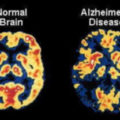
The September issue of The American Journal of Medicine reports that a specific class of antioxidant found in fruit and vegetable juice could stave off Alzheimer’s disease. The Vanderbilt University study suggests that juices are especially effective for people genetically predisposed to the disease.
An investigation into Alzheimer’s disease in older Japanese populations living in Japan, Hawaii and Seattle, Washington, demonstrated that Japanese populations have a lower rate of Alzheimer’s disease than Japanese living in the United States. Armed with this knowledge, a Vanderbilt team of researchers hypothesized that the disparity was probably due to environmental factors, like diet and lifestyle.
To test this hypothesis, the team began a new study, called the Kame Project, made up of 1,836 dementia-free subjects based in Seattle. The team assembled data relating to the Kame group’s intake of fruit and vegetable juice over a 10-year period while monitoring cognitive function every 2 years. The team found that people who drank over 3 serves of fruit or vegetable juice a week reduced the risk of Alzheimer’s by 76 percent compared to those who drank less than 1. The team also found that the beneficial effects were most pronounced in subjects who carried a genetic marker associated with Alzheimer’s.
So far, lab trials have shown that polyphenols can have a potent effect on health, with the potential to significantly delay the onset of serious cognitive impairment. Dai said that the next stage was to test blood samples to discover whether elevated levels of polyphenols are directly linked to a reduced risk of Alzheimer’s, and discover which types of juice are most effective in achieving this outcome.


















Comments are closed.